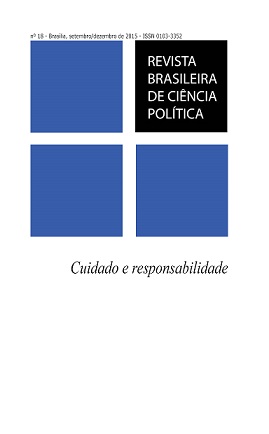Entre o altruísmo e o familismo: a agenda parlamentar feminina e as políticas família-trabalho (Brasil, 2003-2013)
Resumo
Resumo
Com base no levantamento da iniciativa legislativa das parlamentares no Brasil entre os anos de 2003 e 2013, este artigo investiga a natureza da agenda política dessas mulheres, buscando observar se e em que medida elas concedem importância à s políticas de conciliação entre a vida familiar e o trabalho. O artigo conclui que apesar da prioridade conferida a políticas de bem-estar social, as políticas família-trabalho não se destacam e quando advogadas o são principalmente com argumentos de natureza familista. O território de interseção entre políticas de bem-estar social e de equidade de gênero parece amplamente descolonizado. Especulamos que a ínfima presença de mulheres no Congresso pode ser responsável por esse resultado. Mas não podemos descartar como explicações complementares normas tradicionais de gênero e um desconhecimento do potencial socialmente transformador dessas políticas por partidos de esquerda e movimentos de mulheres no país.
Palavras-chave: políticas família-trabalho, equidade de gênero, bem-estar social, mulheres políticas, Brasil.
Abstract
By surveying legislative iniciatives by congresswomen in Brazil in 2003-2013, this article investigates the nature of their political agenda in order to identify if and to what extent they focus on family-work conciliation policies. We found that in spite of the emphasis on traditional social welfare policies, family-work policies are scarce and, when they are advocated, that is done on the basis of familist arguments. The domain that covers the intersection between welfare policies and gender equity seems largely unexplored. We suggest that the miniscule presence of women in Congress may have contributed to this result, but we cannot discard traditional gender norms and an unawareness of the socially transformative potential of those policies by parties of the left and women’s movements in the country as complementary explanations.
Keywords: work-family conciliation policies; gender equity; social welfare; women politicians; Brazil.


